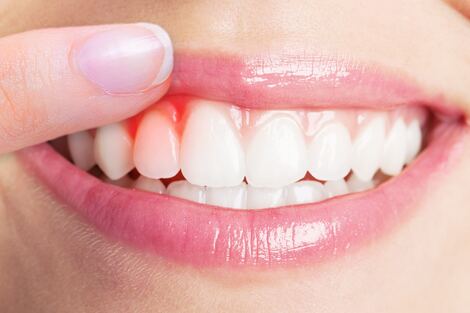Bleeding Gums: Causes, Treatment And Prevention
Bleeding gums? Many people experience them but often ignore them. Sometimes, it’s simply due to brushing or flossing too hard, but it can also be an early warning sign of gum disease. While it might sound alarming, there's no need to panic. Thanks to advancements in dentistry, what used to be a big concern can now be treated easily and effectively. Modern technology has enabled it to catch gum issues early and provide treatments that stop the problem and restore oral health.
Causes of Bleeding Gums
- Plaque Accumulation: Plaque, a soft, sticky film of bacteria, builds up on your teeth. If it's not regularly cleaned away through brushing and flossing, it can harden into tartar. This buildup can irritate and inflame your gums, leading to bleeding.
- Aggressive Brushing or Poor Oral Hygiene: Using a toothbrush with hard bristles or brushing too vigorously can damage gum tissue. Inadequate oral care can also contribute to gum sensitivity and bleeding.
- Vitamin Deficiencies: Insufficient levels of essential vitamins, especially Vitamin C, can weaken gum tissues, making them more susceptible to bleeding. This is often associated with scurvy, resulting from a severe lack of Vitamin C.
- Gingivitis: This initial stage of gum disease involves inflammation of the gums, often causing redness, swelling, and bleeding, particularly when brushing or flossing.
- Periodontitis: When gingivitis is left untreated, it can advance to periodontitis. This more severe form of gum disease affects the deeper tissues supporting your teeth, leading to significant bleeding and potential tooth loss if not managed properly.
Srishti Dental Clinic offers bleeding gum treatment in Madhapur and has listed your best treatment options!
Treatment Options
- Professional Cleaning: A dentist or hygienist will thoroughly clean your teeth and gums to remove plaque and tartar, helping to eliminate the primary cause of gum irritation and bleeding. Benefits: Reduces plaque and tartar buildup, prevents gum disease progression, and improves oral hygiene.
- Scaling and Root Planing: This deep-cleaning procedure targets plaque and tartar below the gumline. Scaling involves scraping away plaque from the tooth surfaces, while root planing smooths the roots to facilitate gum reattachment. Benefits: Helps reduce gum inflammation, prevents further periodontal disease, and promotes healing of the gum tissues.

These treatments aim to address bleeding gums' symptoms and underlying causes, ensuring comprehensive care and long-term oral health.
- Gum Therapy: This treatment includes various methods to reduce gum inflammation and promote healing. It may involve using medicated rinses, topical antibiotics, or antimicrobial agents. Benefits: Controls infection, reduces gum swelling, and helps heal affected gums.
- Fluoride Treatments: Fluoride is applied to the teeth to strengthen enamel and help protect against decay. This treatment can be especially beneficial if gum disease has led to enamel erosion. Benefits: Strengthens tooth enamel, reduces susceptibility to cavities, and complements overall gum treatment by enhancing oral health.
- Antibiotics: Oral or topical antibiotics may be prescribed to address bacterial infections contributing to gum disease. These can be used to manage or eliminate harmful bacteria from the gum tissues. Benefits: Helps control infection, reduce gum inflammation, and accelerate healing.
- Gum Grafting: A gum graft may be performed for patients with significant gum recession. Tissue is taken from another area of the mouth or a donor source and placed over the exposed tooth roots. Benefits: Restores gum tissue, reduces sensitivity, and improves the appearance of the gum line.
- Customized Oral Hygiene Plan: Your dentist will develop a personalized oral care routine tailored to your needs. This includes instructions on proper brushing and flossing techniques and recommendations for effective oral care products. Benefits: Enhances daily oral hygiene practices, reduces the risk of future gum issues, and supports overall gum health maintenance.
Ways to Prevent Gum Diseases
- Brush daily, twice a day, and floss daily to remove plaque.
- Get professional cleanings and check-ups every six months.
- Opt for a brush with soft bristles to prevent gum irritation.
- Stop smoking as it increases the risk of gum disease.
- Consume fruits and vegetables rich in vitamins for healthy gums.
- Drink plenty of water to help clear food particles and bacteria.
- Reduce stress, as it can affect oral health.
- Manage conditions like diabetes that impact gum health.
- Choose a mouthwash to help reduce plaque and bacteria.
- Excessive alcohol can irritate gums, so drink in moderation.
If you are facing gum problems and are looking for bleeding gum treatment in Madhapur, look no further than Srishti Dental Clinic; here, we ensure your proper oral well-being.



